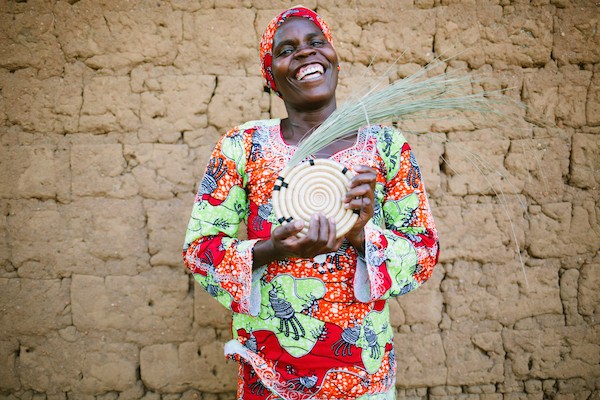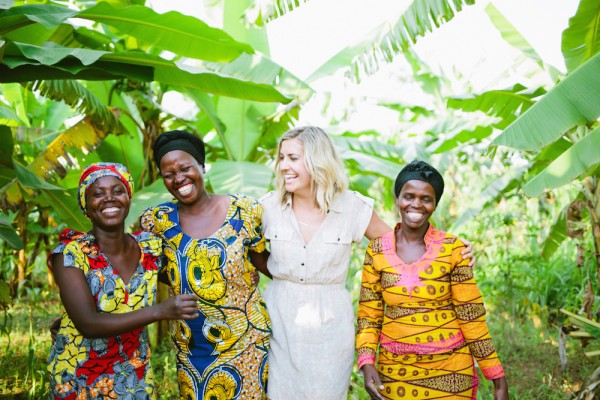I started my career as a corporate buyer for one of the largest retailers in the U.S., the TJX Companies, parent company to TJ Maxx and Marshalls. It was the perfect start for me, but after nearly seven years spent working in six different corporate positions in four cities, I needed a change.
I had been sitting on an idea around socially focused products, and was encouraged to act on it by larger trends I saw in retail. Phrases like “conscious commerce,” “slow fashion,” and “social impact” started to pop up in more and more places to describe the more meaningful relationship consumers seek with the products they choose.
The idea came to me the summer after college, while I was backpacking through South America with my sister. We spent a few weeks in Peru, and a lot of that time with artisan women weaving alpaca. Their work was stunning and we fit as many of their sweaters in our backpacks as we could. But these women had no way to sell their products outside of the tourist season near Machu Picchu. Seven years later, I was still thinking about those artisans and their need to connect with a global market, and worked up the guts to leave my job and set out on my own.
Local + Lejos (“local and distant,” roughly) is a for-profit company, but it is designed first and foremost to create lasting employment for women in developing nations who are struggling to support their families. And I’m talking basics here: food, electricity, running water, and education.

A nesting bowl set from Local+Lejos and grass from the Rwandan bush
Striking the balance between social impact and profit margins is a delicate act, and I am constantly reminding my colleagues (and myself) that a socially conscious business is still a business, not a philanthropic organization. Our customers want to feel good about their choices, sure, but they are also discerning consumers looking for high-quality products. In the home decor market, most “fair trade” goods have traditionally targeted older consumers, emphasizing the social benefits over product design. Local + Lejos tells the story of our artisans and communicates the impact of each purchase, but we strive to reach our customers first through the striking and contemporary designs of our products.
Many of the artisans we work with specialize in one craft, which can lead to production issues when it comes to developing new designs. As an example, I work with a group of weavers in Rwanda who are well versed in making baskets the size of a fruit bowl. However, as soon as dimensions are larger, quality suffers. Sometimes we have an idea for a new product that we know would be successful, but the question is: Will the artisan actually be able to make this product?
I travel to each country we source from (Guatemala, Mexico, Rwanda, and India) to spend time with the artisans during peak production times, to ensure proper training and quality controls. Although this is time-consuming, it is also integral to the company’s mission to spend time with the artisans on the ground to truly understand challenges and needs for every day life.
From my desk in Los Angeles, it can be hard to understand why production takes as long as it sometimes does, why each of a certain type of bowl isn’t the exact same size, or why colors vary within the same production run. But after living in a small town outside of Rwanda’s capital of Kigali for a month, I appreciated how amazing it is that these women are able to produce anything at all. Our artisans are often caring for several children under the age of 5. They’re tending to massive amounts of crops and walking for over an hour to bring back water for cooking and cleaning—all before the sun goes down at 6:30 p.m. Life is hard for these women. What are small chores to us take hours for them to finish because they lack access to such “luxuries” as running water and electricity.
In trying to reach customers, there can be tension between the need to make the business sustainable and staying true to its original purpose. I built the model to be a direct e-commerce retailer, where we sell directly to consumers. However, as with any start-up that needs to grow, our biggest challenge is acquiring new customers—and the way most brands do that is by selling products wholesale to larger retailers. Because my model was not built to serve wholesale accounts, I do not have that wholesale margin built into my prices. I am now rethinking my strategy, to see if there is an opportunity to work with selected retailers in order to grow brand awareness at a faster pace.
But I do have some hesitation about changing our model. I recently had a call with a large player in the socially conscious retail space about potentially working together. The retailer occasionally features other brands that focus on social impact on their site, but requires a 60 percent markup on its end. So, if a Guatemalan serape blanket is $58 on my site, it would want to pay $23.20 for it. Our serape blankets are 100 percent cotton, fit for a queen bed, and must be shipped to the U.S. from Guatemala after production. So, if we decide to go forward with the deal, it would leave us a very small margin. In most retail situations, the brand (my store, in this case) would go to their supplier (women in Guatemala), tell them they have a huge order, and negotiate for much better pricing. But, this is where the struggle comes in for me. Is it fair to continue to provide work, but push my artisans to work for lower wages? If the order goes well, it could greatly benefit our partnership with the artisans, but at what cost? Is it better for me to continue paying them higher wages for smaller orders, or to pay them less for much larger ones? That’s a question I wrestle with everyday.

Rose, a Local+Lejos artisan, sharing a work in progress
Looking ahead, success as a socially responsible brand is possible. Companies like Toms, Warby Parker, and The Reformation are proof of this. The difference however, is that these three companies manufacture in factories both abroad and in the United States. The struggle for businesses like Local + Lejos will be to find the right partners, and enough of them, to scale an artisan-driven business.
The food industry offers a heartening example, considering how the organic market grew from $10 billion to $35 billion in less than a decade. An analogous “social retail” sector is also taking shape, responding to a more conscious consumer culture. However, consumers need to shift their expectations. Fashion retailers like H&M provide new styles within weeks to consumers. Amazon delivers within two days. As socially responsible retail continues to grow, conscious consumers must be patient.
Overall, I am optimistic about the potential for growth of our business. On the consumer side, people care and want to help, though they are not willing to sacrifice design and style. If they are able to find items that are aesthetically pleasing, while also doing some good, they consider it a no-brainer to buy them. On the supplier side, there are many talented women around the world who are eager for the opportunity to work and earn an income. I am confident that the two sides of the equation, the locals (here), and the lejos (far), just need a place to connect.
And as long as they connect, I will be connecting my professional and personal passions as well.
Sheeva Sairafi is the founder of Local+Lejos, and a recent alumna of UCLA’s Anderson School of Management.
*Photos courtesy of Sheeva Sairafi.










